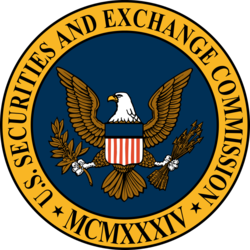U.S. Securities and Exchange Commission
 | |
| Formation | June 6, 1934 |
| Parent organization | US |
| Status | captured |
| Type | regulatory |
| Subpage | •U.S. Securities and Exchange Commission/Chair |
| The US government's agency to regulate the financial sector, generally thought to be completely captured by the larger financial interests. | |
The U.S. Securities and Exchange Commission (SEC) is a regulatory agency of the US federal government, created after the great depression by the Securities Exchange Act of 1934.
Regulatory Capture
The SEC is cited as a canonical example of regulatory capture, as suggested by the revolving door between the financial service sector and the SEC. Numerous frustrated mid level officials have testified to its ineffectual nature.
Securities and Exchange Commission prosecuting attorney, James Kidney, was widely cheered at his retirement party on March 27th, 2014 when he noted that his prosecutions of Goldman Sachs and other mega-banks had been nixed by the agency's higher level staff, because they "were more focused on getting high-paying jobs after their government service than on bringing difficult cases."[1]
9/11 Connection
In September 2001, 7 World Trade Center housed the files relating to approximately 3,000 to 4,000 ongoing SEC cases. Wikipedia asserts that "Although some were backed up elsewhere, others were not, especially those classified as confidential." The 9/11 attacks therefore provided an excuse for any cases inconvenient or displeasing to SEC management to be immediately dropped. Files relating to Citigroup's connection to the WorldCom scandal were lost.[2]
Related Quotation
| Page | Quote | Author | Date |
|---|---|---|---|
| Regulatory capture | “Probably most people would agree that the people paid by the U.S. government to regulate Wall Street have had their difficulties. Most people would probably also agree on two reasons those difficulties seem only to be growing: an ever-more complex financial system that regulators must have explained to them by the financiers who create it, and the ever-more common practice among regulators of leaving their government jobs for much higher paying jobs at the very banks they were once meant to regulate. Wall Street's regulators are people who are paid by Wall Street to accept Wall Street's explanations of itself, and who have little ability to defend themselves from those explanations.” | Michael Lewis | September 2014 |
References
- ↑ http://www.counterpunch.org/2014/04/09/65578/
- ↑
{{URL|example.com|optional display text}}